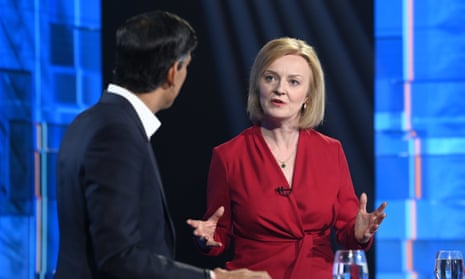There’s a conundrum at the heart of the Conservative party leadership election, and I don’t mean the question of who will win. The more intriguing riddle is this. We know that Tory party members are overwhelmingly pro-Brexit: 79% of them voted leave, according to YouGov. We also know how important “Europe” is for the Conservative faithful, especially when choosing a leader: it’s why they were ready to overlook all considerations of experience, qualifications and electability when they picked an obvious dud like Iain Duncan Smith over Ken Clarke in 2001.
Now consider the choice facing the Tory selectorate. Liz Truss campaigned hard for remain in 2016, warning, presciently as it turned out, “just how difficult it would become to do business” if we were outside the European Union, having to “fill in 50 boxes on a form every time we wanted to export something”. Rishi Sunak, meanwhile, was an ardent Brexiteer, not just in the referendum campaign but for decades before: he was writing jeremiads against Brussels when he was 16. Given all that, leaver Sunak should be miles ahead of remainer Truss. And yet YouGov has Truss beating Sunak among Tory members by 24 points. How can that be?
The answer is that Brexit does not always mean Brexit. Or rather, the meaning of Brexit is not confined to its literal definition. There’s both more and less to it than mere advocacy of a British exit from the EU. It is, in a formulation first used, it seems, by the novelist Nick Harkaway, more of a mood than a policy. Regardless of her stance on the policy, Truss embodies the Brexit mood. And Sunak doesn’t.
It’s partly cultural. Sunak could be a mascot for the slick, hi-tech, high-finance, international elite. The billionaire inlaws, the CV, the look. As one Westminster veteran puts it: “He is such a Goldman Sachs guy,” even down to his personal manner. He can do affable when the cameras are on, but close up, it’s full “master of the universe stuff”.
Truss’s persona is different. The trace of Yorkshire in the accent, the Thatcher cosplay, coupled with her disavowals of her earlier position – she says she was flat “wrong” to back remain – mean she now has a Brexity vibe. Especially when set against Sunak, who, with his non-dom wife and US green card, could have been one of the very “citizens of nowhere” Theresa May had in mind when she uttered that poisonous phrase.
Of course, none of this is fair. One former ministerial colleague calls it “unbelievable cheek” that Truss, who was a cheerleader for the George Osborne austerity programme, which in the ex-minister’s view led millions to vote for Brexit, now poses as the tribune of the left behind: “The only candidate who would allow her to get away with that is an international banker.”
But there is more to the Brexit mood than motifs of class and culture. For the mood is only partly about hostility to Europe. Mainly it’s about hostility to facts. Truss is the true Brexiter in this contest because she subscribes to magical thinking, believing that simply saying something is enough to will it into existence. You just have to close your eyes and wish really, really hard.
Thus she can claim to have “delivered” a solution to the impasse over the Northern Ireland protocol, when in fact she merely introduced a Commons bill that would, if passed, break an international agreement and trigger a possible trade war with the EU. No less hollow is her boast of brokering dozens of trade deals, when in fact, for most of them, she simply did a copy-and-paste on existing EU agreements and “stuck a union jack on top”, as one backbench critic puts it.
But it’s the fantasy economics that proves Truss has been drinking the spirit of Brexit neat. For the leave campaign was built on the delusion that Britain could put up barriers to trade with its closest neighbours and yet become richer as a result. It relied on the likes of maverick economist Patrick Minford, who said a hard Brexit would magic an extra £135bn of annual income for the UK economy. In fact, and entirely predictably, the Office for Budget Responsibility estimates that Brexit has caused an annual loss of some £80bn.
True to her new Brexit colours, Truss is offering a fresh set of numbers that don’t, and never could, add up. She wants simultaneously to cut the money coming into the public coffers and increase the money going out: less tax and more spending at the same time. She’ll cancel the national insurance rise and jack up the defence budget. This is pure cakeism, the philosophy for ever associated with Boris Johnson, but which defined the entire Brexit project with its promise of all the benefits of EU membership – “frictionless trade” and the rest – and none of the cost. Truss says the tax cuts will pay for themselves, by boosting growth, and won’t push up inflation. Asked to cite an authority for such an improbable claim, she names … Patrick Minford.
On it goes, a dreamworld untethered to facts or even observable reality. Today alone, there were six-hour queues at Dover, caused in part by post-Brexit border checks; legal action by the EU over the UK’s failure to comply with the Northern Ireland protocol; and a government announcement that the divorce bill for Brexit could rise to £42.5bn. But none of that must intrude on the fantasy that it was Truss’s vote to remain that was the mistake.
This is now the divide in the Conservative party: not leave v remain, but rather the one memorably described by the unnamed aide to George W Bush who contrasted “the reality-based community” with those who inhabited the realm of faith. Once you’ve made the move from the former to the latter, life is so much freer. In politics, especially, so many opportunities open up. You can say whatever your audience long to hear. Which is why some of Truss’s internal detractors fear that she won’t just be “continuity Boris, but continuity Trump”.
This is what Rishi Sunak is up against now, as he urges his party to ignore the “fairytales” and come back to Tory basics, with a return to sound money. But it’s too late. He may be the advocate of Thatcherite policy – no tax cuts until inflation is tamed – but Truss is the apostle of Thatcherite mood: all pussy bows and talk of upending the status quo, even when that status quo was forged by a decade of Conservative government. Except now there’s the Brexit twist: the flight from facts.
Still, I wouldn’t feel too sorry for Sunak, for he is confronting a monster of his own making. Tory members may have forgotten it, but he backed leave. He helped unleash this beast and rode it all the way to No 11. He sat at Johnson’s side, as the air grew fetid with lies. If he is struggling to breathe now, he knows who to blame.

